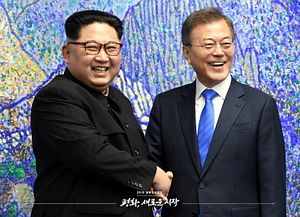Chinese President Xi Jinping left Pyongyang on June 21 after a landmark two-day state visit to North Korea, highlighting a strong alliance between two countries.
The fact that Xi’s trip came amid trade and security tensions with the United States drew more attention to the visit and kept third parties busy analyzing the meaning and possible outcomes, as well as planning their future moves.
But one player seems to be flustered after Xi’s visit to Pyongyang and that is South Korea. As China’s role in the denuclearization process in North Korea becomes more evident, there is a growing concern in South Korea that the room for it to play the role of a “mediator” between Washington and Pyongyang is shrinking.
South Korea’s local media reported that South Korean President Moon Jae-in is said to be closely watching the summit between North Korea and China and working on various ideas regarding the potential impact on stalled negotiations over the denuclearization of the Korean Peninsula.
Some raise the possibility that Xi’s visit to North Korea will change the framework for resolving the nuclear issue in the Korean Peninsula. In other words, the number of involved players in the issue has grown from three — the United States and the two Koreas — to four, with the addition of China.
That view was shared by South Korea’s former unification minister, Jeong Se-hyun, who said in one of the latest parliamentary debates that South Korea should be prepared for and respond to a possible new frame for the denuclearization talks, keeping China in mind.
However, it appears that the South Korean government has a bit of different idea. The country’s presidential Blue House recently said that resuming the stalled talks between the United States and the North is a matter that should be solved between two countries.
Regarding concerns that Xi’s visit to North Korea could weaken South Korea’s role in the denuclearization process, Blue House spokesman Ko Min-jeong said in a briefing that South Korea will seek the fastest way to achieve denuclearization and peace on the Korean Peninsula rather than limiting itself to the mediator role, as media outlets described.
She urged the media to take the overall situation into account, since a summit between South Korean and the United States will also take place soon.
Accordingly, it seems that Moon’s plan for holding another summit with North Korean leader Kim Jong Un before having one with U.S. President Donald Trump is likely to fail. Pyongyang has not responded to the South’s request for the meeting. Plus, Xi now can deliver messages from Kim to Trump at the upcoming G-20 summit, raising the possibility of China stepping into the negotiation process. With that in mind, Kim may have thought there was little to gain from meeting Moon.
The situation is worse for South Korea when considering its relations with Japan. A summit with Japanese Prime Minister Shinzo Abe, the host of the G-20 summit and a major player that affects the situation on the Korean Peninsula, is unlikely to happen, given the poor state of the bilateral relationship. In the most recent development, the South Korean government has not responded to a request from Japan regarding the establishment of a mediation committee to discuss the South Korean Supreme Court’s decision in a lawsuit filed by the victims of Japan’s colonial rule last year.
In response to the questions regarding this issue, the Blue House’s Ko said nothing has been decided regarding the summit with Japan but added that Moon had only said so far that he hoped the meeting would take place. Ko also quoted Moon as saying that he was willing and open to meeting with Japan at any time and that the issue of past history and the current relationship between South Korea and Japan should be seen separate matters.
Only about a week is left before the G-20 summit, where the United States, China, and North Korea (through the intermediary of Xi) may look to make a move. The situation makes it harder for South Korea to maintain a central role.

































